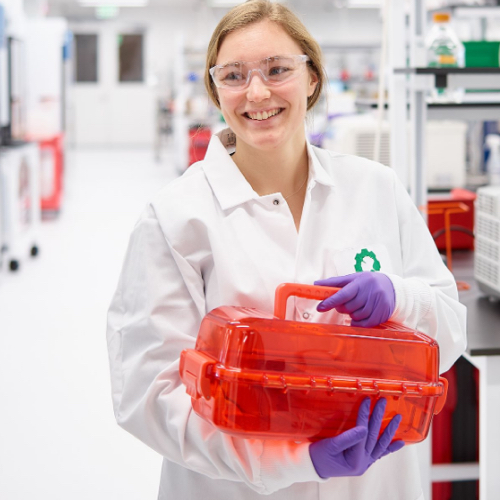Researchers developing novel diagnostics, therapeutics, and vaccines against COVID-19 all rely on DNA encoding viral proteins as a first step for many different kinds of important experiments. As part of our ongoing COVID-19 related work at Ginkgo, we are collaborating with researchers at Stanford University’s Department of Bioengineering and using our DNA design and synthesis capabilities to build DNA that will enable researchers to express these viral proteins—for example the “spike” protein on the surface of the virus that is the target of the vaccine currently in clinical trials, as well as being used in developing rapid point of care diagnostics and antibody-based drugs. We’ll make this DNA available for distribution to academic institutions and companies via Addgene and the BioBrick Foundation’s Freegenes project.
What we’re making

The virus is made up of 11 open reading frames that produce 16 mature non-structural proteins, as well as 4 structural proteins making up the spike, envelope, membrane, and nucleocapsid. The sequence of the genome is available here: NC_045512.2 version of the SARS-CoV-2 viral genome
We’ll synthesize:
- the DNA encoding all of these SARS-CoV-2 proteins on plasmids for expression in E. coli and S. cerevisiae, along with pull down tags (e.g. 6xHis) and T7 promoter for mRNA production
- Viral protein sequences with the addition of watermark sequences to identify them as synthetic
- E. coli and S. cerevisiae-codon-optimized sequences
Do you have other ideas for sequences that would help rapidly boot up R&D for COVID-19? Please reach out to [email protected].
Safety Considerations for Cloning and Distribution
The synthesis of viral genetic sequences obviously comes with risks. Work on biosecurity to protect against the synthesis and release of harmful sequences has been a major priority at Ginkgo for a long time. You can read more about many of our efforts in biosecurity on our blog, or in this article from Bloomberg.
SARS-CoV-2 is an RNA virus and we will not be working with full length viral RNA or any live virus for this project. The NIH Guideline for Research categorizes isolated Coronavirus nucleic acids in Risk Group 2, which means that the cloning of DNA from coronaviruses into nonpathogenic prokaryotic or lower eukaryotic host-vector systems must be performed under BSL-2 containment. De novo synthesis of viral protein does not use full length viral RNA or DNA as input and results in non-infectious plasmid constructs, so can be conducted under BSL-1 containment. Storage and inoculation of frozen glycerol stocks containing cDNA constructs can be performed under BSL-1 as plasmids expressing individual proteins are not infectious.
Additionally, the International Gene Synthesis Consortium, which Ginkgo is a member of, states that:
“IGSC companies will make gene-length sequences from nCov-2019. Under U.S. regulations, these sequences are legal and safe to manufacture and a very important part of vaccine and therapeutic development. If these sequences have certain similarity to SARS or other known regulated pathogens, the synthesis company/ordering institution may need to obtain an export license for shipping across national borders. IGSC members will not provide full length synthetic virus without specific and detailed vetting of ordering entities, and will require a license from the ordering institution from the relevant governing national licensing regimes (e.g. the Federal Select Agent Program in the US).”
Distribution of SARS-CoV-2 cDNA requires recipients to have export licenses, per 1C353 and 1C351 of this document. Distributors, such as Addgene or BBF, would be ultimately responsible for documenting and enforcing this export restriction.
Distribution of Material to Academic Organizations and Companies
Ginkgo will make available any synthesized constructs free or for a nominal fee to academic organizations and companies via a third party distributor, such as Addgene or the BioBrick Foundation, under a non-restrictive material transfer agreement such as the UBMTA or the Open MTA. If you have any questions or have ideas of other sequences that would be valuable to the biotech community fighting COVID-19, please reach out to [email protected].
